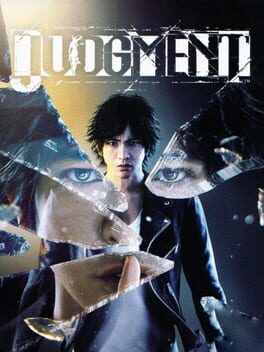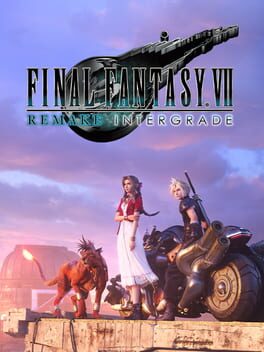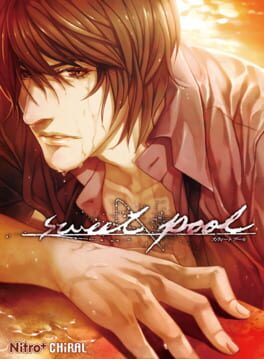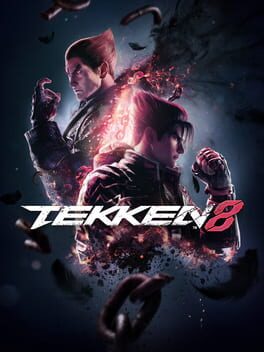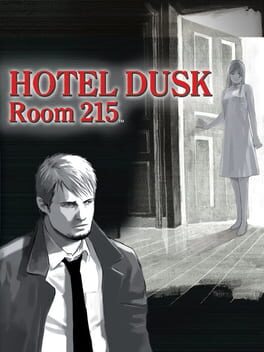Bio
im bad at keeping track of stuff so i probably didnt add dates to a lot of these aha
im bad at keeping track of stuff so i probably didnt add dates to a lot of these aha
Badges

GOTY '23
Participated in the 2023 Game of the Year Event

Best Friends
Become mutual friends with at least 3 others

Liked
Gained 10+ total review likes

Noticed
Gained 3+ followers

3 Years of Service
Being part of the Backloggd community for 3 years

GOTY '21
Participated in the 2021 Game of the Year Event

Full-Time
Journaled games once a day for a month straight

On Schedule
Journaled games once a day for a week straight
Favorite Games
092
Total Games Played
011
Played in 2024
019
Games Backloggd
Recently Played See More
Recently Reviewed See More
kitase you will pay
This review contains spoilers
"What's so wrong with wanting to live?"
The House in Fata Morgana discusses the many facets of life, and the struggle for the rights to it. However, despite its harrowing and cruel themes, what author/creator Keika Hanada has crafted is a stunningly profound visual novel ultimately capable of altering a reader's perception of love and identity.
Along with its characters, art direction, soundtrack, themes and plot, The House in Fata Morgana aims to provide an unforgettable experience elevated beyond one's expectations. Above all, Fatamoru offers one of the most intimately explored, deeply relatable queer stories ever seen before in media– something that should be widely appreciated and celebrated.
Characters/Themes
To me, Fatamoru holds the title of having one of the most fleshed out casts in any modern narrative. Most of the time, media will excel in maybe two areas– that being the protagonist(s) and the antagonist. On the contrary, Fatamoru has proved its worth in almost all areas concerning its characters.
The protagonist, Michel Bollinger is our gateway into truly understanding the core direction of Fatamoru; a story of a queer, intersex transgender man finding love within himself and others despite the incredible amount of pain in his way. Spinning the queerphobic trope on its head, Michel is the key to ceasing a thousand year long curse– becoming the ultimate hero of a dark fantasy tale. Awkward yet charming and firm in his ideals, Michel is a character created with such love and care as to earn the spot of one of the greatest protagonists in gaming of all time.
Alongside Michel stands Giselle, one of the most internally strongest and kindest characters present in Fatamoru. Without Giselle, there would be no present Michel. The two's relationship begins as a struggle against their respective trauma, and blossoms into an eternal love. The amount of reciprocation both sides portray and how real it feels is definitely one of the most charming parts of the story. They both bring out the best in each other, Giselle particularly acting as Michel's anchor and the one true depiction of love the man has ever received in his life.
I could speak pages and pages on how admirable I think Giselle is, honestly. Her character truly brings out the hope and brightness within Fatamoru. I also have to mention the rawness of how Giselle's sexual trauma was portrayed. Door 5 really worked hard to ground Giselle as wholly as possible, including the sensitive topic of SA/rape. It was something very heartbreaking to read but incredibly appreciated in how it was handled.
In almost every aspect, Morgana is portrayed to be the main antagonist of the story. However, I myself along with most readers know her to be more of a deuteragonist. Her past echoes Michel's, every beat of their stories aligning with incredible similarity. They are two sides of the same coin, and knowing this is crucial to understanding their dynamic and relationship within the narrative. Both are seen as otherworldly or religious creatures, held up to a pedestal at one point but brutally rejected the next. Within the folds of radical Christianity, Michel and Morgana fall victims to ostracization and maniacal witch-calling.
Michel and Morgana directly parallel each other– they are examples of one who was able to reach salvation just once during his lifetime compared to one who prayed for an angel that never came for her. Where Michel is kind, Morgana is cruel. Where Morgana is bitter, Michel is forgiving. Though they are both characters who have lived immensely despairing lives, Michel was able to grasp peace just from the understanding and love of one person. And in turn, he is able to pass some semblance of peace towards Morgana, acting as her angel. These two serving as mirror images of each other is one of the most enthralling and bittersweet parts about the writing of Fatamoru.
Of course, Morgana is one of the most well-written characters expanded even more in the prequel story. I will not discuss this here, but she earns her place as a loveable yet snarky youth befitting of her character. Flaws and all, Morgana must learn to heal not by forgiving those who wronged her, but by allowing herself to experience warmth and kindness.
I couldn't go without mentioning our token antagonist Jacopo Bearzatti. He has become one of the most simultaneously hated yet loved characters of all time in my eyes. I can't stand that man but I want to hug him and tell him everything's alright. I want to microwave spaghetti in front of him while his multi-million dollar house burns down. I want to take walks with him as we discuss fine Italian cuisine. I want to spit on his grave then buy him an expensive bouquet to rest on it afterwards. I need him to explode from the face of earth. Jacopo is what makes Fatamoru as morally complex as it is. He is the pinnacle of what makes a flawed character engaging. He is an example of how fast you can lose yourself in search of power. He is everything and he is nothing and I need to kill him. His wavy mullet and Italian gap moe has mesmerized me. Who said that.
I'd like to talk about other characters especially The White-Haired Girl and Yukimasa but this is really long already so pretend I said something profound about them.
Art direction/Soundtrack
The art of Fatamoru is one of the most haunting yet gorgeous works I have ever laid eyes on. Moyataro's art style simply transports the reader into a gothic fairy tale and integrates itself perfectly with the dark, medieval narrative. The soundtrack enhances every minute spent reading– equal parts baroque and classical, uplifting and bright, surreal and just epic. In fact, listening to Giselle's theme has become a staple in my daily life. Mellok'n, Gao, Yusuke Tsutsumi, Takaki Moriya, and Aikawa Razuna did a perfect job at blending the soundtrack together to make me shit my pants and cry and dance at the same time. Thanks.
Something I absolutely adore about Fatamoru is how it utilizes its medium. It may be mostly reading, yes– but its art direction just elevates it to another level. It really feels like I'm going through a beautiful piece of literature complete with sound design and a decorative, medieval-esque UI in the text boxes, menus and whatnot. One part that stands out to me is the red herring used in Door 2 with Yukimasa and "The Merchant". We are given the false impression that they are one in the same, which turns out to be false as it is merely Yukimasa appearing on the right side for a moment to throw off the viewer.
As for sound design, the scarier parts of the novel are given tension with squelching gory sounds, piercing noises and haunting tracks guaranteed to amplify the intensity of the scenes. Bellowing orchestral pieces hammer home tragedy and loss, and sweet moments are carried by lovely vocal tracks. Despite the lack of voice acting, this much is able to entrance the viewer. To be honest, the characters are so fully realized that it is easy to imagine how they'd sound like, down to their intonation and pitch. Seeing the novel fully voiced does sound great, however. If this were remade or serialized into a show, I would like to see how voice acting changes my impression of the characters and story.
Story/Writing
The story of Fatamoru is truly paced to slow burn perfection, with the first three doors introducing episodic storylines with definite endings yet are all veiled in mystery until later on. Every character introduced is iconic and memorable, some more so than others. When it all seemingly comes together as per Morgana's first retelling, we see in hindsight how the curse has affected Mell, Yukimasa, and Jacopo's lives. This is then turned around on its head with the introduction of Door 8, which was one of the most entertaining and revealing sequences of the story. Fatamoru somehow manages to do twist after twist without feeling repetitive; making every story beat interesting and at the same time within the realm of possibility. It is a story which becomes more exciting the more times you reread it– there are so many details, foreshadowing, parallels. The recontextualization of Fatamoru is truly a mind-blowing thing to actively uncover and go through.
Fatamoru weaves in historical accuracy, queer experiences, trauma and grounded relationships, and wonderfully written settings and characters into a masterpiece of literature. Having not read the original Japanese text, I have to give it up to the localization team for translating the source material in such a poetic and mature way without being overly complicated or convoluted. The humorous lines were very much appreciated, as well.
Conclusion
I think The House in Fata Morgana has taken over my life but in the most healthily obsessive way possible. Its themes, characters, music, art– everything has resonated so deeply and profoundly with me ever since the credits hit the screen for the first time. I say this especially as a queer person: Michel is one of the greatest characters to grace this Earth. My only complaint is that WHG and Maria didn't just kiss and elope in Door 3 to leave Jacopo with his stupid stubborn self. Sorry. Can we have Fatamoru but for lesbians please Hanada.
I advise those willing not to shy away from this visual novel even if you've never read one before or are intimidated by the length or any of its darker themes. At the end of the day, The House in Fata Morgana is inspiring, it is uplifting and it will be forever close to my heart as I hope it is to yours.
_____________________________________________________________
*note:
i usually review games, shows and other media in scattered bursts of tweets like an insane person. which is what i did with fatamoru. but it's been six months and this visual novel has been living rent free in my head for every hour of the day and probably will for all eternity. it has captivated me so entirely that it is now my favourite 'game' of all time, which i was not expecting a visual novel to do yet here we are. TLDR read the house in fata morgana
The House in Fata Morgana discusses the many facets of life, and the struggle for the rights to it. However, despite its harrowing and cruel themes, what author/creator Keika Hanada has crafted is a stunningly profound visual novel ultimately capable of altering a reader's perception of love and identity.
Along with its characters, art direction, soundtrack, themes and plot, The House in Fata Morgana aims to provide an unforgettable experience elevated beyond one's expectations. Above all, Fatamoru offers one of the most intimately explored, deeply relatable queer stories ever seen before in media– something that should be widely appreciated and celebrated.
Characters/Themes
To me, Fatamoru holds the title of having one of the most fleshed out casts in any modern narrative. Most of the time, media will excel in maybe two areas– that being the protagonist(s) and the antagonist. On the contrary, Fatamoru has proved its worth in almost all areas concerning its characters.
The protagonist, Michel Bollinger is our gateway into truly understanding the core direction of Fatamoru; a story of a queer, intersex transgender man finding love within himself and others despite the incredible amount of pain in his way. Spinning the queerphobic trope on its head, Michel is the key to ceasing a thousand year long curse– becoming the ultimate hero of a dark fantasy tale. Awkward yet charming and firm in his ideals, Michel is a character created with such love and care as to earn the spot of one of the greatest protagonists in gaming of all time.
Alongside Michel stands Giselle, one of the most internally strongest and kindest characters present in Fatamoru. Without Giselle, there would be no present Michel. The two's relationship begins as a struggle against their respective trauma, and blossoms into an eternal love. The amount of reciprocation both sides portray and how real it feels is definitely one of the most charming parts of the story. They both bring out the best in each other, Giselle particularly acting as Michel's anchor and the one true depiction of love the man has ever received in his life.
I could speak pages and pages on how admirable I think Giselle is, honestly. Her character truly brings out the hope and brightness within Fatamoru. I also have to mention the rawness of how Giselle's sexual trauma was portrayed. Door 5 really worked hard to ground Giselle as wholly as possible, including the sensitive topic of SA/rape. It was something very heartbreaking to read but incredibly appreciated in how it was handled.
In almost every aspect, Morgana is portrayed to be the main antagonist of the story. However, I myself along with most readers know her to be more of a deuteragonist. Her past echoes Michel's, every beat of their stories aligning with incredible similarity. They are two sides of the same coin, and knowing this is crucial to understanding their dynamic and relationship within the narrative. Both are seen as otherworldly or religious creatures, held up to a pedestal at one point but brutally rejected the next. Within the folds of radical Christianity, Michel and Morgana fall victims to ostracization and maniacal witch-calling.
Michel and Morgana directly parallel each other– they are examples of one who was able to reach salvation just once during his lifetime compared to one who prayed for an angel that never came for her. Where Michel is kind, Morgana is cruel. Where Morgana is bitter, Michel is forgiving. Though they are both characters who have lived immensely despairing lives, Michel was able to grasp peace just from the understanding and love of one person. And in turn, he is able to pass some semblance of peace towards Morgana, acting as her angel. These two serving as mirror images of each other is one of the most enthralling and bittersweet parts about the writing of Fatamoru.
Of course, Morgana is one of the most well-written characters expanded even more in the prequel story. I will not discuss this here, but she earns her place as a loveable yet snarky youth befitting of her character. Flaws and all, Morgana must learn to heal not by forgiving those who wronged her, but by allowing herself to experience warmth and kindness.
I couldn't go without mentioning our token antagonist Jacopo Bearzatti. He has become one of the most simultaneously hated yet loved characters of all time in my eyes. I can't stand that man but I want to hug him and tell him everything's alright. I want to microwave spaghetti in front of him while his multi-million dollar house burns down. I want to take walks with him as we discuss fine Italian cuisine. I want to spit on his grave then buy him an expensive bouquet to rest on it afterwards. I need him to explode from the face of earth. Jacopo is what makes Fatamoru as morally complex as it is. He is the pinnacle of what makes a flawed character engaging. He is an example of how fast you can lose yourself in search of power. He is everything and he is nothing and I need to kill him. His wavy mullet and Italian gap moe has mesmerized me. Who said that.
I'd like to talk about other characters especially The White-Haired Girl and Yukimasa but this is really long already so pretend I said something profound about them.
Art direction/Soundtrack
The art of Fatamoru is one of the most haunting yet gorgeous works I have ever laid eyes on. Moyataro's art style simply transports the reader into a gothic fairy tale and integrates itself perfectly with the dark, medieval narrative. The soundtrack enhances every minute spent reading– equal parts baroque and classical, uplifting and bright, surreal and just epic. In fact, listening to Giselle's theme has become a staple in my daily life. Mellok'n, Gao, Yusuke Tsutsumi, Takaki Moriya, and Aikawa Razuna did a perfect job at blending the soundtrack together to make me shit my pants and cry and dance at the same time. Thanks.
Something I absolutely adore about Fatamoru is how it utilizes its medium. It may be mostly reading, yes– but its art direction just elevates it to another level. It really feels like I'm going through a beautiful piece of literature complete with sound design and a decorative, medieval-esque UI in the text boxes, menus and whatnot. One part that stands out to me is the red herring used in Door 2 with Yukimasa and "The Merchant". We are given the false impression that they are one in the same, which turns out to be false as it is merely Yukimasa appearing on the right side for a moment to throw off the viewer.
As for sound design, the scarier parts of the novel are given tension with squelching gory sounds, piercing noises and haunting tracks guaranteed to amplify the intensity of the scenes. Bellowing orchestral pieces hammer home tragedy and loss, and sweet moments are carried by lovely vocal tracks. Despite the lack of voice acting, this much is able to entrance the viewer. To be honest, the characters are so fully realized that it is easy to imagine how they'd sound like, down to their intonation and pitch. Seeing the novel fully voiced does sound great, however. If this were remade or serialized into a show, I would like to see how voice acting changes my impression of the characters and story.
Story/Writing
The story of Fatamoru is truly paced to slow burn perfection, with the first three doors introducing episodic storylines with definite endings yet are all veiled in mystery until later on. Every character introduced is iconic and memorable, some more so than others. When it all seemingly comes together as per Morgana's first retelling, we see in hindsight how the curse has affected Mell, Yukimasa, and Jacopo's lives. This is then turned around on its head with the introduction of Door 8, which was one of the most entertaining and revealing sequences of the story. Fatamoru somehow manages to do twist after twist without feeling repetitive; making every story beat interesting and at the same time within the realm of possibility. It is a story which becomes more exciting the more times you reread it– there are so many details, foreshadowing, parallels. The recontextualization of Fatamoru is truly a mind-blowing thing to actively uncover and go through.
Fatamoru weaves in historical accuracy, queer experiences, trauma and grounded relationships, and wonderfully written settings and characters into a masterpiece of literature. Having not read the original Japanese text, I have to give it up to the localization team for translating the source material in such a poetic and mature way without being overly complicated or convoluted. The humorous lines were very much appreciated, as well.
Conclusion
I think The House in Fata Morgana has taken over my life but in the most healthily obsessive way possible. Its themes, characters, music, art– everything has resonated so deeply and profoundly with me ever since the credits hit the screen for the first time. I say this especially as a queer person: Michel is one of the greatest characters to grace this Earth. My only complaint is that WHG and Maria didn't just kiss and elope in Door 3 to leave Jacopo with his stupid stubborn self. Sorry. Can we have Fatamoru but for lesbians please Hanada.
I advise those willing not to shy away from this visual novel even if you've never read one before or are intimidated by the length or any of its darker themes. At the end of the day, The House in Fata Morgana is inspiring, it is uplifting and it will be forever close to my heart as I hope it is to yours.
_____________________________________________________________
*note:
i usually review games, shows and other media in scattered bursts of tweets like an insane person. which is what i did with fatamoru. but it's been six months and this visual novel has been living rent free in my head for every hour of the day and probably will for all eternity. it has captivated me so entirely that it is now my favourite 'game' of all time, which i was not expecting a visual novel to do yet here we are. TLDR read the house in fata morgana
depression
